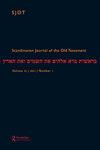A Lion Ate Grass like an Ox: Nebuchadnezzar and Empire Transformation in Daniel Four
IF 0.1
3区 哲学
0 RELIGION
引用次数: 0
Abstract
ABSTRACT Daniel 4 presents a complex combination of botanical and animal metaphors in relation to Nebuchadnezzar. In this article, these metaphors are explained by means of ancient Near Eastern royal ideology. By considering animal imageries in royal buildings, the concept of “cosmic tree” in relation to royal gardens and banquets, the oppressive and violent character of Nebuchadnezzar comes to the surface. From such characterization, the transformation of Nebuchadnezzar into an herbivore animal is understood to be part of the process of his humanization. This process is clarified by the intertextuality between Daniel 4 and 7, which explains the transformation of a lion into an ox; and between Daniel 4 and Isaiah 11, which explains the ethical exhortation of Daniel 4,24[27]. Nebuchadnezzar’s humanization, therefore, is seen as his submission to the ethical values required by the Most High for any political power, be it a foreigner or a Davidic king. The article concludes with the purpose of such message for Judahites under the power of Antiochus IV.狮子像牛一样吃草:《但以理书四》中的尼布甲尼撒和帝国转型
摘要《但以理书》第四章对尼布甲尼撒进行了复杂的植物和动物比喻。在本文中,这些隐喻是通过古代近东王室意识形态来解释的。通过考虑皇家建筑中的动物形象,以及与皇家花园和宴会有关的“宇宙树”的概念,尼布甲尼撒的压迫和暴力的性格浮出水面。从这样的特征,尼布甲尼撒转变为食草动物被理解为他的人性化过程的一部分。但以理书第4章和第7章的互文性阐明了这一过程,这解释了狮子变成公牛的过程;在但以理书4章和以赛亚书11章之间,这解释了但以理书4章24节的道德劝诫。因此,尼布甲尼撒的人性化,被视为他对任何政治权力——无论是外国人还是大卫王朝的国王——所要求的道德价值观的服从。文章总结了安条克四世统治下的犹太人的目的。
本文章由计算机程序翻译,如有差异,请以英文原文为准。
求助全文
约1分钟内获得全文
求助全文

 求助内容:
求助内容: 应助结果提醒方式:
应助结果提醒方式:


